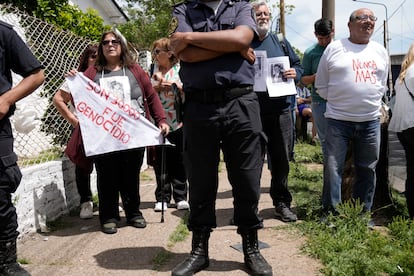Public snubs, little dialogue, criticism that is fired from the media and social networks without prior notice, exclusions from official events: the relationship between the far-right Javier Milei and his vice president, Victoria Villarruel, has been deteriorating day by day for months. Although there are no direct attacks between them, the conflict is already undeniable and they do not hide it either in Casa Rosada or in the presidency of the Senate, where Villarruel holds the office by constitutional mandate. There, in the premises of Congress where she has her office, Villarruel feels confined, without room for political action after Milei broke her campaign promise to give her control of at least two ministries. “It is like having a lioness in a cage,” say those close to the vice president. The tension between the main authorities of the Government is not free. In the last week, the weak pro-government parliamentary “troop” lost two seats and in both cases the issues that confront Milei and Villarruel crossed paths.
As one minister of the Executive observes, in Milei’s government there are two lines of the Argentine right, “one more liberal and the other more conservative.” The president would represent the first—despite his positions against abortion and gender policies, among other things—; the vice president promotes herself as an exponent of the second. While Milei’s central discourse has been to deregulate the economy and dismantle the State, with “the caste” as the main enemy, Villarruel’s discourse, the daughter and granddaughter of military officers, has focused on dismantling the social consensus reached in democracy around human rights policies, an expression of the denial of state terrorism perpetrated during the last dictatorship (1976-1983).
The virtual harmony of these roles lasted as long as the electoral campaign. As soon as the far-right government took office last December, Villarruel was removed from decision-making. The previous agreement was that the Defense and Security portfolios would remain under the vice president’s control, but Milei ceded them to representatives of the now dissolved center-right alliance formed by the PRO —the party of former president Mauricio Macri (2015-2019)— and the Unión Cívica Radical (social democrat). Villarruel did not receive any compensation.
From then on, the discontent grew and the short circuits were repeated. The Executive attributed responsibility to Villarruel for the scandal that broke out due to the increase in the allowances of the senators and for the latest defeats suffered by the ruling party in the Upper House, such as the loss of control of a key commission – the bicameral one that supervises the Intelligence Secretariat – and the approval of a law that increases pensions – reversing the adjustment applied by Milei, who already signed the veto to the law. One of the most evident clashes occurred when Villarruel defended the soccer players of the Argentine national team, champion of America, who had sung racist songs to the detriment of their French counterparts. Days before an official visit by Milei to Paris, the vice president was publicly disavowed by the Executive and the Secretary General of the Presidency and sister of the president, Karina Milei, personally apologized before the French Embassy in Buenos Aires.
Those close to the vice president complain about the “friendly fire” and that no one tells them in advance what decisions are incumbent on them. They emphasize that Villarruel has no influence on what the senators vote for – in fact, she is not a senator, although by her position she is the president of the Chamber and has a tie-breaking vote if necessary – and that she has always been loyal to the president. They also say that, when faced with similar problems, the head of the Chamber of Deputies, Martín Menem, receives much more favorable treatment from the Executive. The darts are not aimed so much at Milei as at her closest circle, especially against Santiago Caputo, the presidential advisor without a formal position, but also at the president’s sister. With Karina Milei, they point out, there is a relationship of respect “between two women with strong personalities.” Villarruel defined this difficult relationship in March: she said that, between her and Karina, the president was caught in the middle like a “poor little ham.”
Excluded or sidelined from various official events, the vice president is carrying out her own parallel activities. She is seen touring the interior of the country and cultivating an image that she intends to contrast, in form and style, with that of Milei: she presents herself as a sort of representative of the extreme right with “good manners”, more nationalist and respectful of institutional rules.
Memory at play
The granddaughter, daughter and niece of military officers, Villarruel built her public image on the vindication of the victims of political organizations that in the seventies turned to armed struggle. From the Center for Legal Studies on Terrorism and its Victims (Celtyv), she has been advocating for years for what she calls “complete memory,” an attempt to establish that there was a civil war in Argentina and that the crimes of armed groups are comparable to crimes against humanity perpetrated by the State.

In the Senate last Tuesday, the vice president set the stage to give institutional support to this speech that legitimizes the dictatorship. The purpose was to commemorate the International Day of the Victims of Terrorism and, there, her words raised the need to “leave the past behind us, but with justice.” “We will reopen all the cases of victims of terrorism,” she announced and stated that “all” the former members of Montoneros, the Peronist armed org
anization, “must be in prison for bloodying our Nation.” She did not mention that various cases have already been tried and that many of those supposedly involved were murdered or disappeared during the dictatorship, with no trace of them. Until now, the courts have considered the crimes of the guerrilla organizations to be prescribed and have refused to judge them as crimes against humanity.
Just a few hours later, the Executive distanced itself, once again, from the vice president’s remarks. “Obviously it is an issue on Villarruel’s agenda because it is her banner.” […] “It is an issue that is not on the President’s agenda today,” said Casa Rosada spokesman Manuel Adorni on Wednesday.
With similar words, Milei had sought to distance herself, days before, from the visit that six pro-government deputies made to imprisoned repressors, such as the former marine Alfredo Astiz, for kidnapping, torture and murder. The scandal and the repudiation that this trip to the Ezeiza prison generated led to the weakening of the La Libertad Avanza bench in the lower house: one of the deputies who participated in the meeting, Lourdes Arrieta, denounced that she had traveled deceived and that she did not know who she would meet with. She later revealed that the objective of the meeting was to develop a project for the repressors to be released. She left the bloc before they kicked her out.
Villarruel claims to have had nothing to do with the visit to the repressors, but many in the ruling party are suspicious. And they remember that she used to visit the former dictator Jorge Rafael Videla in prison.

The judge and the caste
A firestorm between the president and his vice president is the Supreme Court of Justice. To fill two vacancies in the highest court, Milei proposed federal judge Ariel Lijo and conservative lawyer Manuel García-Mansilla. If the second is driven by ideological affinity, the first is part of an agreement between advisor Caputo and current Supreme Court judge Ricardo Lorenzetti, currently in the minority within the court, made up of five magistrates.
Lijo is opposed by numerous civil society organizations, part of the opposition and even allies of the government, such as former president Macri. Also by Villarruel: “He is a controversial judge who does not have the necessary credentials,” he said. Those close to the vice president affirm that she sees him as a member of the judicial “caste.” And they dismiss the idea that her objections are only due to the fact that he is one of the judges who refused to consider the Montoneros crimes as crimes against humanity.
The rejection of Lijo led to the loss of another seat for La Libertad Avanza last Wednesday. In this case, in the Upper House, which must deal with the appointment of judges. Senator Francisco Paoltroni, who had been in the front row of the event organized on Tuesday by Villarruel, openly declared that he would not approve the nomination of Judge Lijo, whom he defined as “the guarantee of the caste system.” In addition, he asked for the resignation of advisor Caputo, nicknamed “the magician of the Kremlin,” for his political operations in the shadows. The Executive gave him the thumbs down and his fellow bench members sent a letter to Villarruel asking him to expel him from the space. The vice president responded that the request was “inappropriate” and that this decision should be made by the block and not by the president of the Senate.
Some media outlets considered that Villarruel’s response was a challenge to Milei and the vice president, through her social networks, fired this Thursday: “I tell the media to stop looking for headlines that divide and to dedicate themselves to reporting without sensationalism.” The message was intended to be a gesture of relaxation towards the Rosada, but the Senate presidency admitted discomfort because no one had consulted them, nor had they been informed of Paoltroni’s removal. In any case, the Government had already paid the cost of the internal disputes: it now has 6 legislators of its own out of a total of 72 in the Senate and 32 out of 257 in the House of Representatives.
Subscribe here to the EL PAÍS América newsletter and receive all the key information on current affairs in the region.
#Javier #Milei #vice #president #Victoria #Villarruel #chronicle #growing #conflict
